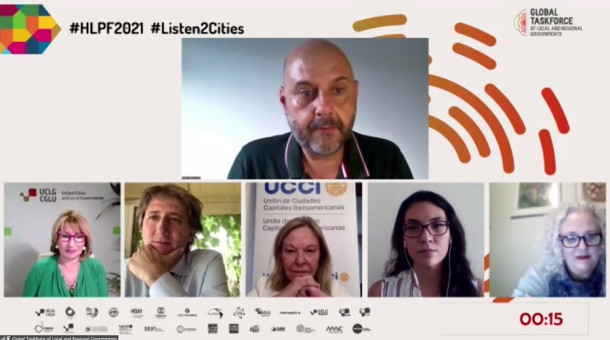
The UN High Level Political Forum highlights the role metropolises play in local transformation towards sustainable development
The Covid-19 pandemic has turned the way we live in cities upside-down and has forced us to rethink how we design and build our urban environments as safe and liveable spaces. The UN High-Level Political Forum (HLPF) 2021, which took place from 6 to 15 July, was an opportunity to gather different insights and lessons about how local and regional governments are addressing the impact of the pandemic and recovery with the ultimate aim of not leaving anyone behind and achieving the 2030 Agenda.
Since it was first held in 2013, the HLPF has become the main United Nations platform on sustainable development, and has a central role in following up on the implementation of the SDGs and the 2030 Agenda for Sustainable Development.
During this year's forum, the discussions were marked by concepts that, although present in urban debates prior to the global crisis, were not as important as they are today in terms of designing urban and metropolitan policies. In this regard, two concepts with particular relevance to metropolitan governance should be highlighted.
First of all, multilevel cooperation and coordination. The pandemic has brought to light how a local policy and/or plan can have a greater and more positive impact when coordinated with different levels of government across a region. This coordination is needed in non-emergency situations, but it is especially vital in times of crisis.
The second concept to keep in mind is complexity. The governance of metropolitan spaces should incorporate complexity from the very beginning, as it is one of the characteristics that define the metropolitan reality. Complexity can be understood not as a set of linear and overlapping local and global dynamics, but as a framework of non-linear and interconnected decisions and opportunities made by different stakeholders from different regional scales (from a local to an international level, and anthropic and natural dynamics).
One of the areas in which these concepts are important, given their positive impact, is in the field of inclusion-related policies, especially gender issues. All the debates shared the importance of caring activities during the pandemic—activities that are mainly carried out by women—, as a cornerstone for the resilience of the social fabric. To effectively incorporate this vision in the policymaking process, we need coordination between different scales in a region (vertical coordination), and across the departments of the same local and/or regional government (horizontal coordination). This helps foster the emergence of synergies and identify the complex answers required to include the 50% of the population that have historically been excluded from the decision-making process.
The metropolitan perspective during the HLPF 2021
Metropolis was an active participant in the HLPF, and was part of the launch of the Joint Statement to the 2021 High-Level Political Forum on Sustainable Development together with 28 other international institutions. This statement is a result of the work Metropolis has been involved in as part of the Global Task Force and it is aligned with the debates held during the HLPF 2021, highlighting the importance of strengthening multi-level governance and capacities for Local and Regional Governments (LRGs), and the importance of inclusive policies that reduce the socio-economic gaps that already existed prior to the pandemic.
Metropolis also moderated the session Launch of the VLR of the Metropolitan Area of Florence. This session was part of the joint work carried out together with UN-Habitat and UCLG, focusing on the role of metropolises in achieving local transformation towards sustainable development, with a particular focus on Voluntary Local Reviews (VLRs). In this session, we were given the opportunity to understand how cities such as Buenos Aires, Barcelona, Surabaya and New York have embraced VLRs as a process to successfully implement and monitor the SDGs at a local scale.
Lastly, under the topic “Fostering a recovery that is resilient and led by the communities” the fourth Local and Regional Governments Forum (LRGF), a Special Event at the HLPF 2021, was also a space for metropolitan discussion in which members of the Metropolis network such as Montevideo, Nouakchott, Amman and Santiago de Chile shared how they are implementing the SDGs from the perspective of public service provision and multilevel metropolitan governance.
Watch the recording of the discussions at the event's page.

